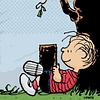Take a photo of a barcode or cover
funny
inspiring
reflective
medium-paced
funny
informative
inspiring
lighthearted
medium-paced
I loved this book. It was a lovely mix of comedic memoir and biblical commentary, and I found myself often surprised at how inspired I was by many of the practices that she engaged in for this project, as well as how much I learned. I want to recommend to SO many people now, which always tells you it was an excellent book. If it sounds remotely interesting to you, go read it!
For 3 stars, I REALLY liked this book. Evans takes on an extreme project to address some extreme issues. She approaches her year with an honest mix of self-proclaimed "snark" stemming from her beliefs as a "liberated woman", and openness for what the scriptures have to say to her Christian faith.
She is certainly out to prove a point: the Evangelical Christian community cherry picks from the Bible when it discusses Biblical Womanhood. I think she proves that point explicitly. Her discussion of the way we read Paul's Epistles in her chapter on silence is especially eye-opening.
Along the road to supporting this thesis, Evans proves herself malleable by finding surprising meaning in traditionally female roles and duties, such as a love of cooking.
I think the most valuable contribution she makes to the discussion of Biblical Womanhood is stripping away layers of tradition and discrimination from the original texts, and explaining when and why some of these layers were applied.
As much as I liked the book, I couldn't give it more stars for 2 major reasons. First, one of the well-publicized extremes Evans goes to is sleeping in a tent in her front yard for a stretch of days while menstruating. She admits in the book that this is not prescribed by the Bible, nor currently practiced by any group claiming to do so as a Biblical ordinance. In fact, this experiment comes out of the pages of the fictional account of Dinah in "The Red Tent." I find this portion of Evan's book over-the-top and debasing of her otherwise authentic project.
Secondly, and more of a personal preference, Evans is primarily a blog writer, and her book reflects this genre. While it does make for a very easy, enjoyable read, I find it distracting at times. It may be old-fashioned, but I find it strange to read about an author's struggles, time-crunches, and interviews surrounding the writing and publishing of the very book I'm reading within that book. The bulk of Evan's book is so enlightening and starkly stated. These tangents cheapened the book for me.
She is certainly out to prove a point: the Evangelical Christian community cherry picks from the Bible when it discusses Biblical Womanhood. I think she proves that point explicitly. Her discussion of the way we read Paul's Epistles in her chapter on silence is especially eye-opening.
Along the road to supporting this thesis, Evans proves herself malleable by finding surprising meaning in traditionally female roles and duties, such as a love of cooking.
I think the most valuable contribution she makes to the discussion of Biblical Womanhood is stripping away layers of tradition and discrimination from the original texts, and explaining when and why some of these layers were applied.
As much as I liked the book, I couldn't give it more stars for 2 major reasons. First, one of the well-publicized extremes Evans goes to is sleeping in a tent in her front yard for a stretch of days while menstruating. She admits in the book that this is not prescribed by the Bible, nor currently practiced by any group claiming to do so as a Biblical ordinance. In fact, this experiment comes out of the pages of the fictional account of Dinah in "The Red Tent." I find this portion of Evan's book over-the-top and debasing of her otherwise authentic project.
Secondly, and more of a personal preference, Evans is primarily a blog writer, and her book reflects this genre. While it does make for a very easy, enjoyable read, I find it distracting at times. It may be old-fashioned, but I find it strange to read about an author's struggles, time-crunches, and interviews surrounding the writing and publishing of the very book I'm reading within that book. The bulk of Evan's book is so enlightening and starkly stated. These tangents cheapened the book for me.
This earns 3.5 stars for me. I read the male version (A Year of Living Biblically) awhile ago, which I enjoyed, but it was fun to read it from a female perspective and of course I related better to it.
Rachel writes with wit and humor. I am comfortable in my own personal belief and faith and enjoy learning how others choose to worship and believe. I learned a lot from her book (never heard of Junia before) and enjoyed her descriptions of the struggles she encountered trying to take the Bible's instructions for women as literally as possible.
Rachel writes with wit and humor. I am comfortable in my own personal belief and faith and enjoy learning how others choose to worship and believe. I learned a lot from her book (never heard of Junia before) and enjoyed her descriptions of the struggles she encountered trying to take the Bible's instructions for women as literally as possible.
informative
reflective
medium-paced
I put this on my Kindle after I read some blurb thinking it would be good for a laugh. Which it was. It also pissed me off to the degree where I wished it was a paper book that I could chuck across the room. Ugh. IMO religion sucks ass. I liked her take on empowering yourself against the odds though, and lots of interesting history and cultural bits made it worth the read. Eshet Chayil, indeed.
I picked this one up because after reading all the bru-ha-ha I was curious as to how her story actually read. The answer - pretty amazing. It's not a definitive work (but then nothing could be) but it has a go at reading the Bible's teachings on femininity and womanhood thoughtfully. I particularly found her explorations of the way different Judeo-Christian traditions approached the same texts and how that might inform her own thinking. This a profoundly personal account and yet in telling it gives much food for thought. An excellent book on the whole and highly recommended.
(more like a 3.5 stars for me)
This should have been read a decade ago when it was written, but here we are in 2022…
What felt like a quirky experiment on living “according to what the Bible says” actually sheds light on many “hows” in Christianity—How do I read the Bible (or, How do I arrive at the lens by which I choose to read the Bible?)? How does this influence my actions and values? How does this affect how I interact with others in the world?
RHE has been a helpful voice for me, encouraging me to stop, think, and tell the truth. She will always be missed.
“For those who count the Bible as sacred, interpretation is not a matter of WHETHER to pick and choose, but HOW to pick and choose. We are all selective. We all wrestle with how to interpret and apply the Bible to our lives. We all go to the text looking for something, and we all have a tendency to find it. So the question we have to ask ourselves is this: Are we reading with the prejudice of love or are we reading with the prejudices of judgment and power, self interesting and greed?
If you were looking for Bible verses with which to support slavery, you will find them. If you are looking for verses with which to abolish slavery, you will find them. If you’re looking for verses with which to oppress women, you’ll find them. If you are looking for verses with which to liberate and honor women, you will find them. If you are looking for reasons to wage war, you will find them. If you are looking for reasons to promote peace, you will find them. If you are looking for an outdated and irrelevant ancient text, you will find it. If you are looking for truth, believe me you will find it.“
This should have been read a decade ago when it was written, but here we are in 2022…
What felt like a quirky experiment on living “according to what the Bible says” actually sheds light on many “hows” in Christianity—How do I read the Bible (or, How do I arrive at the lens by which I choose to read the Bible?)? How does this influence my actions and values? How does this affect how I interact with others in the world?
RHE has been a helpful voice for me, encouraging me to stop, think, and tell the truth. She will always be missed.
“For those who count the Bible as sacred, interpretation is not a matter of WHETHER to pick and choose, but HOW to pick and choose. We are all selective. We all wrestle with how to interpret and apply the Bible to our lives. We all go to the text looking for something, and we all have a tendency to find it. So the question we have to ask ourselves is this: Are we reading with the prejudice of love or are we reading with the prejudices of judgment and power, self interesting and greed?
If you were looking for Bible verses with which to support slavery, you will find them. If you are looking for verses with which to abolish slavery, you will find them. If you’re looking for verses with which to oppress women, you’ll find them. If you are looking for verses with which to liberate and honor women, you will find them. If you are looking for reasons to wage war, you will find them. If you are looking for reasons to promote peace, you will find them. If you are looking for an outdated and irrelevant ancient text, you will find it. If you are looking for truth, believe me you will find it.“






